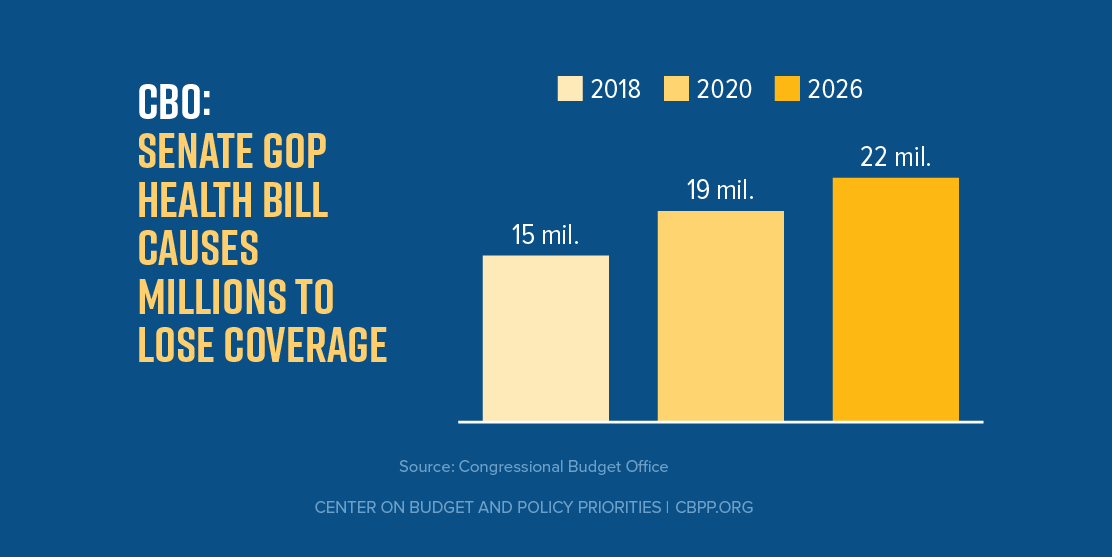BEYOND THE NUMBERS
In Case You Missed It…
This week at CBPP, we focused on health care, the federal budget and taxes, family income support, the economy, and state budgets and taxes.
- On health care, we explained that the Senate Republican bill to repeal the Affordable Care Act is just as harmful as the House version. Edwin Park pointed to the Congressional Budget Office’s estimates of the Senate bill, which show that 22 million more people would lose coverage by 2026, the Senate bill’s cuts to Medicaid would be deeper than the House-passed bill, and those cuts would deepen significantly in the second decade. Park also reported that Senate Republican leaders reportedly plan to add a new provision to their bill that would give another tax break to high-income individuals by letting Health Savings Account holders use their account contributions to pay their health insurance premiums. Brandon DeBot underscored that the wealthy and corporations would still be the big winners under the Senate health bill even if Senate Republicans remove one of the bill’s many regressive tax cuts.
Aviva Aron-Dine and Tara Straw explained that the Senate bill would hurt marketplace consumers by cutting tax credits, and increasing their premiums and deductibles. Aron-Dine and Leibenluft noted that middle-class families would face higher costs and worse coverage under the Senate health bill. Jessica Schubel pointed out the little-noticed changes to Medicaid in the Senate health bill that would hurt over 70 million low-income Americans by worsening coverage, reducing state flexibility, and raising uncompensated care costs. She also explained that the Senate bill makes it harder to maintain their current Medicaid spending by restricting state taxes on health care providers. Leibenluft warned that the Senate is likely to continue using a secretive process to hide its health bill’s damaging impact. Peggy Bailey cautioned that the extra funding Senate Republicans may add to the bill to address the opioid crisis wouldn’t undo the bill’s harm.
Jesse Cross-Call cited new Urban Institute estimates showing that all states would experience huge coverage losses under the Senate health bill. Cross-Call also highlighted state analyses showing that the GOP health bills would fuel deep Medicaid cuts. Aron-Dine, Cross-Call, Schubel, and Tara Straw explained that Alaskans could suffer the most harm under the Senate version of the GOP health plan. Judith Solomon noted that the Senate health bill would put Alaska’s Medicaid expansion at grave risk beginning in 2020. Aron-Dine detailed why West Virginia would be among the worst-harmed states under the Senate bill. We illustrated how the Senate health bill would hurt low- and moderate-wage workers in Nevada. We also rounded up our analyses and graphics that illustrate how the Senate bill would hurt coverage and affordability for millions of Americans.
- On the federal budget and taxes, Robert Greenstein outlined the House’s plan to fast track tax cuts for the wealthy and cuts to low-income programs, including SNAP (formerly food stamps) and Temporary Assistance for Needy Families (TANF).
Joel Friedman detailed why House Budget Committee Chair Diane Black’s reported budget resolution that would increase defense spending while cutting non-defense discretionary programs would fail to make it through a bipartisan appropriations process. Sharon Parrott and Isaac Shapiro debunked the claims that those calling for deep cuts in basic assistance for people of limited means commonly use to defend their proposals.
Guillermo Herrera and Friedman unpacked the Trump budget’s tax and spending plans and unrealistic assumptions. Arloc Sherman cautioned that the funding levels for the Census Bureau proposed by President Trump and the House Appropriations Committee are far less than what’s needed for a successful census.
- On family income support, Ife Floyd pointed to TANF’s experience to show why block grants are bad deals for states.
- On the economy, we updated our backgrounder on the number of weeks of unemployment benefits available in each state.
- On state budgets and taxes, we updated our backgrounder on Taxpayer Bills of Rights.
Chart of the Week – CBO: Senate GOP Health Bill Causes Millions to Lose Coverage
A variety of news outlets featured CBPP’s work and experts recently. Here are some highlights:
How the Republicans’ health-care plan betrays Republicans’ own principles
Washington Post
June 29, 2017
The False Premise Behind G.O.P. Tax Cuts
New York Times
June 29, 2017
How the Senate’s Health-Care Bill Threatens the Nation’s Health
The New Yorker
June 26, 2017
This chart shows the stunning trade-off at the heart of the GOP health plan
Vox
June 26, 2017
Medicaid Cuts May Force Retirees Out of Nursing Homes
New York Times
June 24, 2017
Don’t miss any of our posts, papers, or charts — follow us on Twitter, Facebook, and Instagram.

